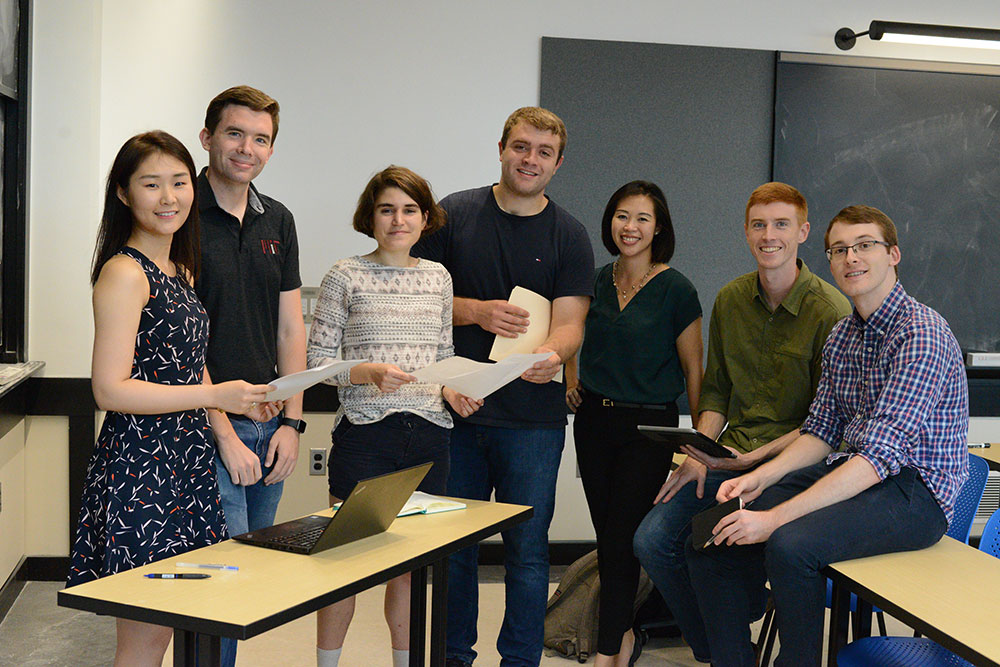More effective and persuasive communicators

Exelon Corporation manager of corporate strategies Jacob Jurewicz (’14, SM ’15) spends much of his time communicating complex technologies and business concepts to this Fortune 500 energy provider’s executives, enabling them to make critical investment decisions. “Despite all of the emphasis on technical understanding and technical thinking, real impact in the energy industry is made by the most effective and persuasive communicators,” he says. And Jurewicz credits much of his communication acumen to his experience as a Fellow in the MIT Nuclear Science and Engineering Communication Lab.
Since 2014, the NSE Comm Lab, through its graduate student Communication Fellows, has coached the NSE community in crafting documents and presentations that best convey students’ and postdocs’ intent, instilling understanding and concurrence in their audience, and, where appropriate, fostering action. “Clients,” as those who seek the Comm Lab’s services are called, laud the program for helping them attain sought-after positions in academia and industry.
Dr. Marina Dang administrates the NSE Comm Lab. With a PhD in chemistry from Brandeis University, Dang brings experience in research, teaching, curriculum design and social work. She explains that prospective clients approach the Comm Lab with a specific communications task with which they’re seeking guidance. Such a project might be a job application, a slide presentation, a grant proposal, or a journal article, as long as it is technical in nature. Clients may wish to seek the Comm Lab’s service just once, or many times for numerous projects.
Clients are paired with a Communication Fellow who will work with them in the fashion of a partnership. As NSE grad students themselves, the Fellows offer a colleague’s technical perspective and understanding of the task at hand. Rasheed Auguste (’17), who used the Comm Lab for lab reports and graduate school applications, says, “Fellows identified with my own experiences and helped me express them in a way only other NSE members can do.” In addition to assisting students, Fellows report improvement of their own communication skills, a clear benefit when embarking on job searches.
Trained through a series of workshops, the Fellows serve as coaches eliciting clients to identify the results the clients would like to see, and then prompting them to work out effective means of attaining their goals. “There’s a difference between a tutor and a coach,” says Dang. “A tutor guides step by step, whereas a coach steers from the back. In our case, the Fellows drive the conversation using direct feedback and open-ended prompts like ‘given the audience, how much background do we want here?’ In the end, the client is the one doing most of the work. We’re here to improve the writer, not the document .”
Alongside one-on-one coaching sessions is an online collection of guides to scientific communication, the “CommKit. Produced by its Communication Fellows, each guide is a short, self-contained introduction to crafting a successful document or presentation.
Testimony from students, Fellows, faculty and employers confirms the effectiveness of Comm Lab coaching. Former student Yang Yang (PhD ’18), now a postdoc at the Lawrence Berkeley National Lab’s National Center for Electron Microscopy, credits receiving an award for his presentation to Materials Research Society 2019 Fall Meeting, to “skills I learned from the NSE Communication Lab. Practicing presentations alone is very different from practicing in front of someone.”
Since its 2014 inception, Fellows have coached more than 250 NSE community members in more than 1,000 sessions. “Over the past five years, the NSE Comm Lab has emerged as a wonderful resource for NSE students and postdocs,” says NSE Department Head, Professor Anne White. “I’m looking forward to what the future will bring.”
Written by William Litant. Photo by NSE Communication Lab.
February 2020
